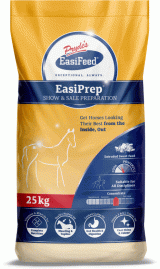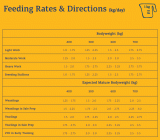




per 1kg
Digestible Energy13.9MJ
Crude Protein14.4%
Crude Fibre4.0%
Oil5.1%
Salt1.0%
Lysine6.7g
Lysine Digestibility*86%
Methionine2.1g
Methionine Digestibility*86%
Threonine4.5g
Threonine Digestibility*83%
Calcium10.0g
Phosphorous6.0g
Sodium4.0g
Chloride7.0g
Magnesium4.4g
Potassium5.4g
Copper57mg
Zinc165mg
Selenium0.9mg
Manganese140mg
Iodine1.2mg
Iron160mg
Cobalt0.4mg
Vitamin A9800IU
Vitamin E280IU
Vitamin D1300IU
Vitamin K4.0mg
Vitamin B1 (Thiamine)18.9mg
Vitamin B2 (Riboflavin)4.9mg
Vitamin B3 (Niacin)67.7mg
Vitamin B5 (Pantothenic Acid)16.1mg
Vitamin B6 (Pyridoxine)7.7mg
Folic Acid4.8mg
Biotin0.2mg
Vitamin B1237.8µg
* Indicates Protein Bioavailability - the higher the value the easier the protein is to digest
Light Exercise: Up to 60 mins walking, or 30 mins walking, trotting and cantering.
Moderate Exercise: Up to 120 mins walking and trotting, or 30-60 mins trotting, cantering and some galloping.
Intense Exercise: 30-60 mins intense skill work, short duration galloping, racing and endurance.
Introduce into a horse’s ration gradually over 2 weeks.
Feed in conjunction with ample forage (pasture, hay and/or chaff).
Make clean, fresh water and salt available at all times.
Adjust the amount fed so it is appropriate for a horse’s body fatness, stage of training and workload, along with the quality and quantity of forage available.
Divide feeds into two or more smaller meals if feeding more than 0.5 kg per 100 kg of bodyweight in ‘hard feed’ per day.
The feeding rates given here are based on the amount of feed needed to meet a horse’s vitamin and mineral requirements. If you feed below these feeding rates, vitamin and mineral deficiencies will appear in the diet and may affect health and limit performance. To avoid this, simply add one of Pryde’s EasiBalanced Pellets to top up vitamin and mineral intakes.
